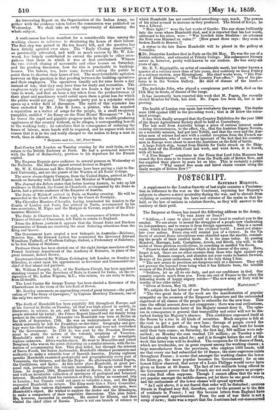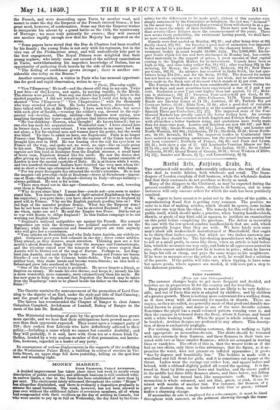The Emperor at Genoa has issued the following address to
the Army. " To THE AUNT OP ITALY!
" Soldiers,—I come to place myself at your head to conduct you to the combat. We are about to second the struggles of a people now vindicating its independence, and to rescue it from foreign oppression. This is a sacred cause, which has the sympathies of the civilized world. I need not stimu- late your ardour. Every step will remind you of a victory. In the Via Sacra of ancient Rome inscriptions were chiselled upon the marble, remind- ing the people of their exalted deeds. It is the same today. In passing Menden' Marengo, Lodi, Castiglione, Areole, and Rivoli, you will, in the midst of those glorious recollections, be marching in another Via Sacra.
" Preserve that strict discipline which is the honour of the army. Here, forget it not, there are no other enemies than those who fight against you in battle. Remain compact, and abandon not your ranks to hasten forward. Beware of too great enthusiasm, which is the only thing I fear.
" The new armes de precision are dangrous only at a distance. They will not prevent the bayonet from being what it has hitherto been, the terrible weapon of the French infantry. " Soldiers, let us all do our duty, and put our confidence in God. Our country expects much from you. From one end of France to the other the following words of happy augury reecho—' The new army of Italy will be worthy of her elder sister.' "Given at Genoa, May 12, 1859. NAPOLEON." We subjoin the last letter of our Paris correspondent. "The two great facts of the week are the manifestation of popular sympathy on the occasion of the Emperor's departure and the unbounded eagerness of all classes of the people to subscribe for the new loan. This time the official account does not exaggerate ; there was real enthusiasm, and the most inveterate hater of his Majesty cannot deny it. The opin- ion in consequence is general that tranquillity and order will not be dis- turbed during his Majesty's absence. This confidence expressed itself at the Bourse by a rise in all kinds of securities. Much surprise is felt at the rush to get a part of the new loan; throngs of people crowd the Mairies and different offices, long before they open, and wait for hours until their turn comes ; on Saturday, the first day, 300 million were sub- scribed ; on Monday the sum reached 735 million ; on Tuesday a mil- liard had already been asked for ; and it is thought before the end of the week this latter sum will be doubled. The coupures for 10 francs of Rent, which are irreducible, are in great request among the working classes ; a large manufacturer from the provinces, who employs 1500 hands, told me that every one had subscribed for 10 francs ; the same eagerness exists throughout France ; it seems that amongst the working classes the lower the Rents go, the more popular becomes the Government ; for as one honest fellow observed, that screw of a Louis Philippe would never have given us Rents at 60 francs. The fact of two milliards being offered to the Government proves that the French are not such paupers as prosper- ous John Bull often supposes. Though I cannot affirm that the war is yet popular amongst the middle classes, yet let there be one good victory, and the enthusiasm of the lower classes will spread upwards.
" As I said above, it is not feared that order will be disturbed ; anxious friends in England may feel, therefore, easy for the present as to the fate of residents in France ; I say this because letters from England have lately expressed apprehensions. From the seat of war there is not a scrap of news ; there was a report that the Austrians had out-manceuvred the French, and were descending upon Turin by another road, and meant to enter the day the Emperor of the French entered Genoa ; it has great need, however, of confirmation. Some say that the Emperor wishes to inaugarate his advent by a grand battle on the 14th, the anniversary of Marengo ; we must wait patiently for events ; they will succeed one another rapidly enough now that his Majesty has appeared on the Beene.
" Some papers have stated that the Due de Chartres had been recalled by his family ; the young Duke is not only with his regiment, but in the very van of the Piedmontese army, and will undoubtedly take part in the first engagement. The Royal Princes were delighted that their young nephew, who lately came out second at the military examination at Turin, notwithstanding his imperfect knowledge of Italian, has an opportunity of gathering fresh laurels by the side of his countrymen. " The feeling of confidence grows stronger ; there is another con- siderable rise today on the Bourse."
Another correspondent, a visitor in Paris who has unusual opportuni- ties for good and rapid observation, writes to us—
"Paris, Thursday night. " Vive l'Empereur ! Reis off—and the cheers still ring in my ears. Twice I saw him—at the: Louvre, and again, by moving rapidly, in the Riven. The streets were packed. Does any one doubt his popularity ? listen to the excited populace. I did not intend to cheer—but I could not help it, and shouted • Vire l'Empereur !" Vive l'Imperatrice !' with the thousands who were crowded about him. He looks robust, hearty, determined. I have talked with him at the Tuileries ; I have seen him often, but never with such glow of !health,—wearing the soldier's cap, dressed in the regi- mental red—bowing, saluting, smiling—the Empress now crying, now laughing through her tears—made a picture that leaves strong impressions.
"He was thinking—Heaven, what thought ! He knows himself; but no one else has made his acquaintance. Wonderful man ! I have abused him in former days, I now must retract. I was mistaken in my man; but I am not alone, a few far-sighted men and women knew his power, but the world was blind. 'Tis time to admit an hero, one Napoleonic. Paris is no longer France—but Napoleon. I crossed with the captain of the Calais boat that brought him over in 1848. He was leaning over the rail his eyes bent on France all the way, and spoke not, no word, no sign—like an eagle going to his nest. Then people laughed at him—now they commend. The same captain saw him land at Boulogne from the English steamer, a small hand of brave men, Napoleon dressed like his uncle. He saw the doctor shot after giving up his sword, what a strange history. The special constable of London is now the special constable of Italy. He is at Genoa while I write, and two hundred thousand Italians have received the very man whom Or- sini so short a time ago attempted to destroy. The age is big with change.
"For ten years Bonaparte has attracted the world's attention. He is now the magnet—all powerful—bold at Boulonge—brave at Strasbourg—ingeni- ous at Ham—thoughtful in England—literary in Italy—always military- alwapolitical. He now is for action.
"Three
men stand out in this age—Constantine, Cavour, and, towering over them is Napoleon.
" Why do you abuse him ? I mean fear—you do not—you seem to under- stand him. You deserve the thanks of right-minded Englishmen for being his supporter; you gave facts ; you have shown yourself true to England by good will to France. Why are the English journals goadine' him on ? The red flags of the matador produce frenzy. What has the Emperor done ? has he not been true to the alliance ? has he deceived England ? If so, tell me when name one act ? He said the Empire was Peace. Did he not go to war with Russia to oblige England ? In this Italian campaign is he not working out English ideas
"England's national antipathies are against the French. Her natural sympathies are with the Germans ; her political aspirations are for the Italians ; while her commercial and financial prayers are with anybody who will give her a commission. "Your articles on Neutrality, and why Italy hates Austria, are widely co- pied. Galignani gave you four columns in one day ; three entire articles. They attract, as they deserve, much attention. Thinking men see a few month's ahead Russian flags flying over the mosques and Constantinople, and the tricolour raised over the minarets of Cairo ; some expect that Austria will be blotted out of the map of Europe. Perhaps so. Let Eng- land join Austria, and such may be the case. Russia and France are bosom friends—I saw that on the Crimean battle-fields. Two bold men fight, neither beat, they shake hands and become warm friends; an idea born at Sebastopol grew into manhood at Stutgard. " One of the Emperor's traits is gratitude. He never forgets a friend, or forgives an enemy. He made his own throne, and keeps it ; already his life is more wonderful, more romantic, more extraordinary than his uncle. lie has now gone to Italy to demand that Napoleon the Second may be taken from the Hapsburgs' tomb to be placed beside his father on the banks of the Seine ! "



























 Previous page
Previous page